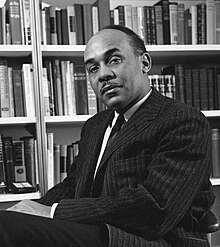Invisible Man
[6] Ellison says in his introduction to the 30th Anniversary Edition that he started to write what would eventually become Invisible Man in a barn in Waitsfield, Vermont (actually in the neighboring town of Fayston[7]), in the summer of 1945 while on sick leave from the Merchant Marine."[10] Before Invisible Man, many (if not most) novels dealing with African Americans were written solely for social protest, notably, Native Son and Uncle Tom's Cabin.[citation needed] Ellison signals his debt in the prologue to the novel, where the narrator remembers a moment of truth under the influence of marijuana and evokes a church service: "Brothers and sisters, my text this morning is the 'Blackness of Blackness'.According to Rampersad, it was Melville who "empowered Ellison to insist on a place in the American literary tradition" by his example of "representing the complexity of race and racism so acutely and generously" in Moby-Dick.[citation needed] The letters he wrote to fellow novelist Richard Wright as he started working on the novel provide evidence for his disillusion with and defection from the Communist Party USA for perceived revisionism.However, Bledsoe gives several sealed letters of recommendation to the narrator, to be delivered to friends of the college in order to assist him in finding a job so that he may eventually earn enough to re-enroll.He is assigned first to the shipping department, then to the boiler room, whose chief attendant, Lucius Brockway, is highly paranoid and suspects that the narrator is trying to take his job.He later happens across the eviction of an elderly black couple and makes an impassioned speech that incites the crowd to attack the law enforcement officials in charge of the proceedings.The narrator escapes over the rooftops and is confronted by Brother Jack, the leader of a group known as "the Brotherhood" that professes its commitment to bettering conditions in Harlem and the rest of the world.Clifton is shot and killed by a policeman while resisting arrest; at his funeral, the narrator delivers a rousing speech that rallies the crowd to support the Brotherhood again.Understanding that Rinehart has adapted to white society at the cost of his own identity, the narrator resolves to undermine the Brotherhood by feeding them dishonest information concerning the Harlem membership and situation.The narrator gets mixed up with a gang of looters, who burn down a tenement building, and wanders away from them to find Ras, now on horseback, armed with a spear and shield, and calling himself "the Destroyer".Critic Orville Prescott of The New York Times called the novel "the most impressive work of fiction by an American Negro which I have ever read", and felt it marked "the appearance of a richly talented writer".
The Invisible ManThe Invisible Man (disambiguation)Ralph EllisonEdward McKnight KaufferBildungsromanAfrican-American literaturesocial commentaryRandom HouseDewey DecimalLC ClassAfrican Americansblack nationalismMarxismBooker T. WashingtonNational Book Award for FictionAfrican-American writerModern Library100 best English-language novels of the 20th centurypicaresqueMalcolm Bradburyblack existentialistThe New York TimesBarack ObamaDreams from My FatherWaitsfield, VermontFaystonMerchant MarineCyril ConnollyHorizonNational Book AwardNative SonUncle Tom's CabinIrving HoweHarlem RenaissanceBlack Arts MovementJohn Oliver KillensancestorsT. S. EliotRichard KostelanetzThe Waste LandWilliam FaulknerErnest HemingwayParis ReviewNotes from UndergroundDostoevskyArnold RampersadHerman MelvilleIshmaelMoby-DickRichard WrightCommunist Party USArevisionismbourgeoisieall-black collegebattle royaltrusteeparanoidshock treatmentHarlemblack nationalisttenementOrville PrescottSaul BellowThe New RepublicAnthony BurgessElizabeth CatlettTrinity Church CemeteryJuneteenthThree Days Before the Shooting...Denby, DavidThe New YorkerNational Book FoundationGrossman, LevGreg GrandinWayback MachineAlfred ChesterThe Paris ReviewKostelanetz, RichardThe Iowa ReviewJohn F. CallahanPrescott, OrvilleBellow, SaulCommentaryupenn.eduVarietyThe Man with the Golden ArmNelson AlgrenCollected Stories of William FaulknerFrom Here to EternityJames JonesThe Adventures of Augie MarchA FableTen North FrederickJohn O'HaraThe Field of VisionWright MorrisThe Wapshot ChronicleJohn CheeverThe Magic BarrelBernard MalamudGoodbye, ColumbusPhilip RothThe Waters of KronosConrad RichterThe MoviegoerWalker PercyMorte d'UrbanJ. F. PowersThe CentaurJohn UpdikeHerzogThe Collected Stories of Katherine Anne PorterKatherine Anne PorterThe FixerThe Eighth DayThornton WilderJerzy KosińskiJoyce Carol OatesMr. Sammler's PlanetThe Complete StoriesFlannery O'ConnorChimeraJohn BarthAugustusJohn WilliamsGravity's Rainbow